Ovulation is the most fertile point of your menstrual cycle. Find out how likely pregnancy is if you’ve had unprotected sex around this time.
-
Tracking cycle
-
Getting pregnant
-
Pregnancy
-
Help Center
-
Flo for Partners
-
Anonymous Mode
-
Flo app reviews
-
Flo Premium New
-
Secret Chats New
-
Symptom Checker New
-
Your cycle
-
Health 360°
-
Getting pregnant
-
Pregnancy
-
Being a mom
-
LGBTQ+
-
Quizzes
-
Ovulation calculator
-
hCG calculator
-
Pregnancy test calculator
-
Menstrual cycle calculator
-
Period calculator
-
Implantation calculator
-
Pregnancy weeks to months calculator
-
Pregnancy due date calculator
-
IVF and FET due date calculator
-
Due date calculator by ultrasound
-
Medical Affairs
-
Science & Research
-
Pass It On Project New
-
Privacy Portal
-
Press Center
-
Flo Accuracy
-
Careers
-
Contact Us
Unprotected sex during ovulation: Am I pregnant?
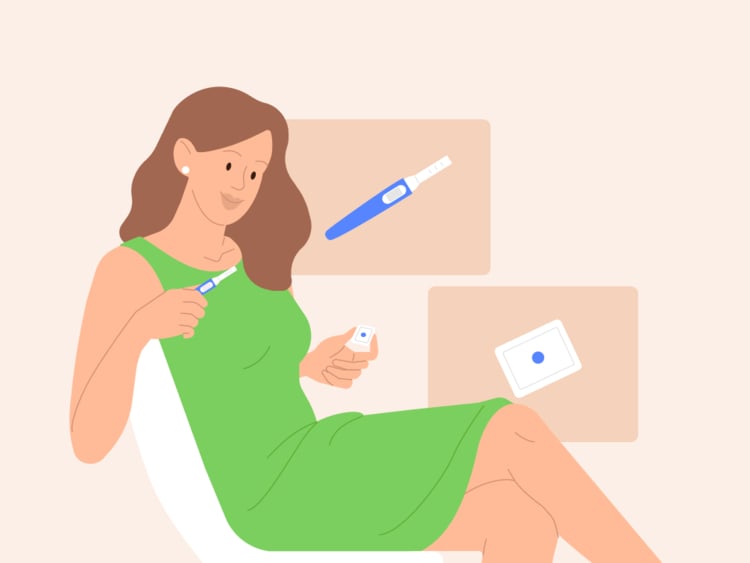

Every piece of content at Flo Health adheres to the highest editorial standards for language, style, and medical accuracy. To learn what we do to deliver the best health and lifestyle insights to you, check out our content review principles.
If you’re familiar with your cycle, you might already know that ovulation is when your ovary releases an egg into your fallopian tube. It happens once per menstrual cycle, and “the days leading up to — and including — ovulation are considered our most fertile,” explains Dr. Jenna Beckham, obstetrician, gynecologist, and complex family planning specialist, WakeMed Health and Hospitals, Planned Parenthood South Atlantic, North Carolina, US. In other words, “this is when conception is most likely to happen.”
So, if you’ve had unprotected sex around this time, does that mean you’re pregnant?
Not necessarily. “It doesn’t always result in pregnancy,” Dr. Beckham says. The chances peak at around a 42% likelihood. But it’s certainly the best time to have unprotected sex if you’re trying for a baby — and the most important time to nail contraception if you’re not.
So let’s back up. What is ovulation? What does it mean for you? And if you’ve had unprotected sex around this time, what are your next steps?
Key takeaways
- Ovulation is when your ovary releases an egg into your fallopian tube, where it remains viable for 12 to 24 hours. If the egg is fertilized by sperm during this time (i.e., if you’ve had unprotected sex), you could become pregnant.
- Your “fertile window” describes the five days leading up to ovulation and the day of ovulation. These are the days of your menstrual cycle in which unprotected sex is most likely to lead to pregnancy.
- In the context of pregnancy talk, unprotected sex is any penis-in-vagina sex that doesn’t involve the effective use of contraception — e.g., a condom or the pill.
- If you’ve had unprotected sex around ovulation but don’t want to be pregnant, seek out emergency contraception as soon as possible (either from a health care professional or a pharmacy).
- To know whether you’re pregnant, wait until your next period is due to start, and if it doesn’t show, take a pregnancy test.
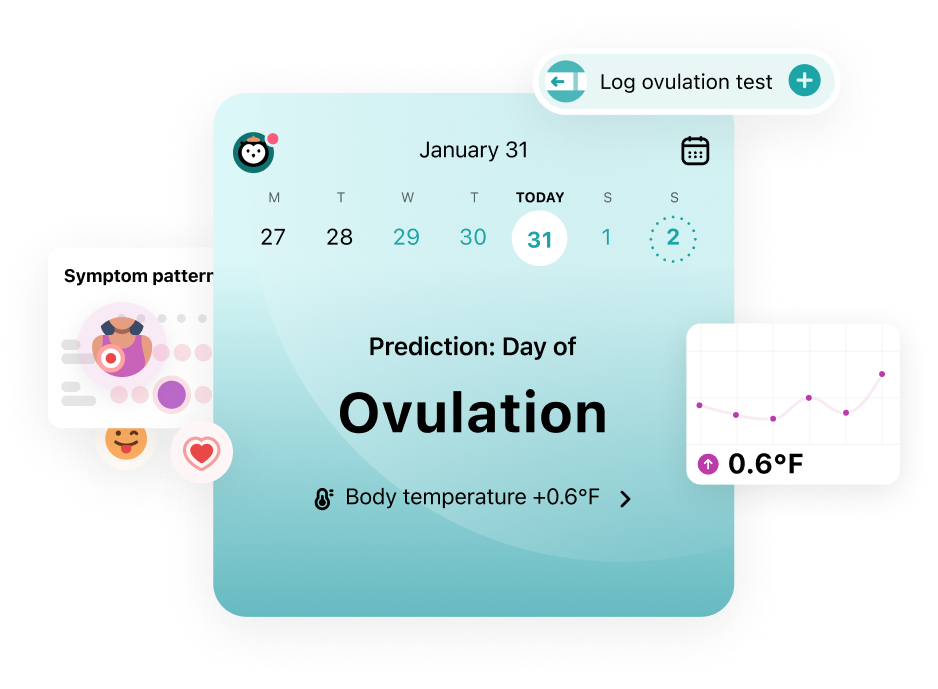
 Over
7.8M
ratings averaging
4.8/5
*
Over
7.8M
ratings averaging
4.8/5
*
Understand your fertility better with the Flo app
- Learn more about your fertility signals
- Improve ovulation predictions by tracking temperature via Apple Watch
- Log your ovulation test results
 Over
7.8M
ratings averaging
4.8/5
*
Over
7.8M
ratings averaging
4.8/5
*
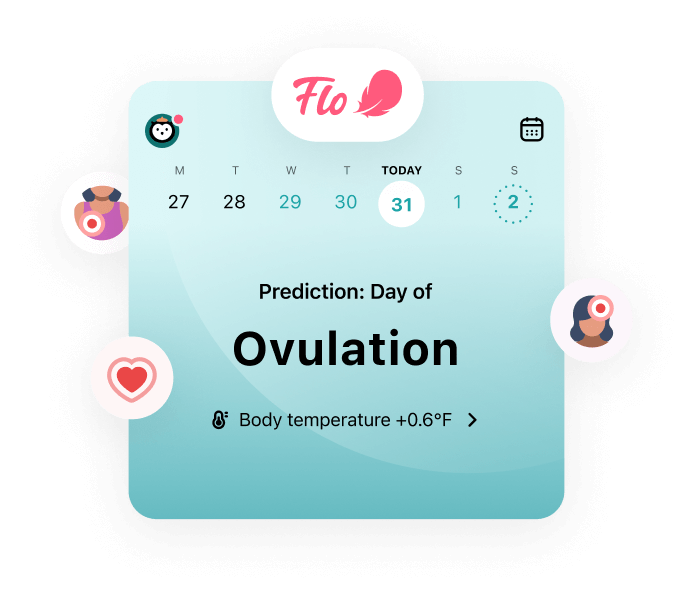
Trying to conceive?
The Flo app can help you better understand your fertility

 Over
7.8M
ratings averaging
4.8/5
*
Over
7.8M
ratings averaging
4.8/5
*
Understand your fertility better with the Flo app
- Learn more about your fertility signals
- Improve ovulation predictions by tracking temperature via Apple Watch
- Log your ovulation test results
Take a quiz
Find out what you can do with our Health Assistant
What is ovulation?
We’ve all likely heard that pregnancy happens when a sperm fertilizes an egg. But our eggs aren’t just floating around, ready to be fertilized at any time. Typically, just one egg is released from our ovary into our fallopian tube each menstrual cycle. This is ovulation.
The egg remains viable for 12 to 24 hours. This is when a sperm might fertilize it, and this could lead to pregnancy. But if it goes unfertilized, the egg will disintegrate, and another one will come along in the next cycle.
“Ovulation typically occurs in the middle of the cycle,” says Dr. Beckham. This is the case if you have an average 28-day cycle. “However, every person’s cycle is different, and cycles can even vary from month to month,” she explains.
So, how are you supposed to know?
You can use an ovulation-tracking app like Flo to track when it’s likely to happen for you. Just log your period dates each month, and we’ll predict all your ovulation and fertile window dates (more on that below) based on your personal health data. Flo shouldn’t be used as contraception or a family planning device, but it can help you understand your body better.
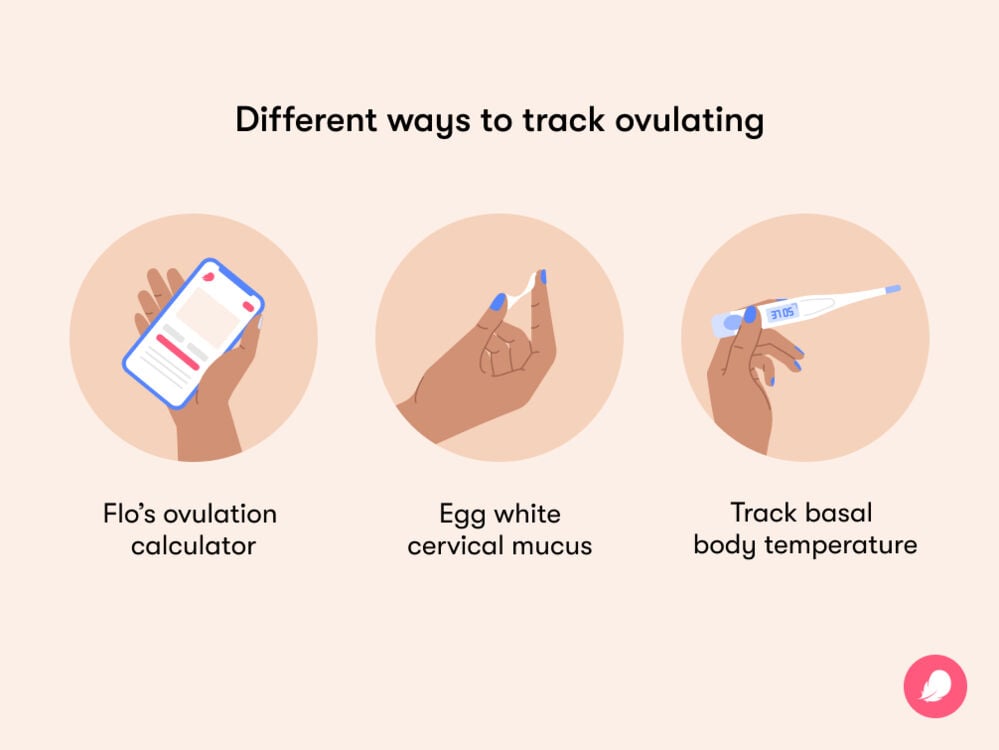
To know when to have sex to get pregnant, you can also:
- Get an estimation of your most fertile days with our ovulation calculator.
- Watch for egg white cervical mucus. Your cervical mucus, which exits your body as a vaginal discharge, turns clear, stretchy, and slippery around ovulation — like egg whites.
- Track your basal body temperature over time. Your basal body temperature is your body’s temperature at rest, and it increases slightly after you’ve ovulated. It can be monitored using a basal thermometer from a drugstore.
These measures are sometimes called the fertility awareness method, and some people use them to try to avoid pregnancy. However, they aren’t considered to be an effective means of contraception. Learn more about how to track ovulation and how to track ovulation with irregular periods.
What is the fertile window?
The fertile window is the six days in your menstrual cycle when you’re most likely to get pregnant, and it all revolves around ovulation (aka, the moment your ovary releases that egg).
Your fertile window includes:
- The five days leading up to ovulation
- The day of ovulation
What’s with the five days before? Well, when you have unprotected sex, as Dr. Beckham points out, the sperm can live in your uterus for up to five days. So, even if that egg is released up to five days later, it’s still very possible for the sperm to fertilize it and for a pregnancy to occur.
What is unprotected sex?
In the context of conception and pregnancy talk, unprotected sex is any penis-in-vagina sex that doesn’t involve the effective use of contraception, e.g., a barrier method like a condom, or hormonal birth control such as the pill or an IUD.
It’s still unprotected sex if you:
- Tried to use a condom, but it broke or came off
- Are supposed to be on the pill, but you’ve been missing days
- Didn’t use contraception but pulled out before ejaculation
What to do if you’ve had unprotected sex during ovulation
1. Consider whether you want to use emergency contraception
If you’re trying to get pregnant or you’d be happy if you were, this one’s not for you.
But if you don’t want to be pregnant, first, breathe. Don’t panic! But do seek out emergency contraception as soon as possible, says Dr. Beckham. Remember, ovulation is the prime time for pregnancy to occur, so it’s not worth the risk of just “hoping for the best.”
Your options are:
- The emergency contraceptive pill: There are different types of pills you can take, so make sure you talk to your doctor about the most accessible one for you and how quickly you need to take it. You need to take some emergency contraceptive pills within three days, while there is a window of five days for others.
- A copper IUD: This also functions as emergency contraception and can be inserted up to five days afterward.
The IUD is actually the most effective method of emergency contraception and is always Dr. Beckham’s recommendation if unprotected sex occurred around ovulation. This is because emergency contraceptive pills work by preventing ovulation — meaning if you’ve already ovulated, they’ll be less likely to be effective.
2. Wait until your next expected period
While it can be tempting to rush out to buy a pregnancy test as soon as you’ve had unprotected sex, for the most accurate results, you should wait until your next period is due. See if it comes, and if it doesn’t, that’s when you take the test.
Why? Pregnancy tests work by checking your pee for traces of the pregnancy hormone, human chorionic gonadotropin (hCG). But hCG production takes a little while to get going. So if you test too soon, before hCG has risen to a detectable level yet, you could get a false negative result — even though you are actually pregnant.
If you’ve taken emergency contraception, “one can expect to get a period around three weeks later,” says Dr. Beckham.
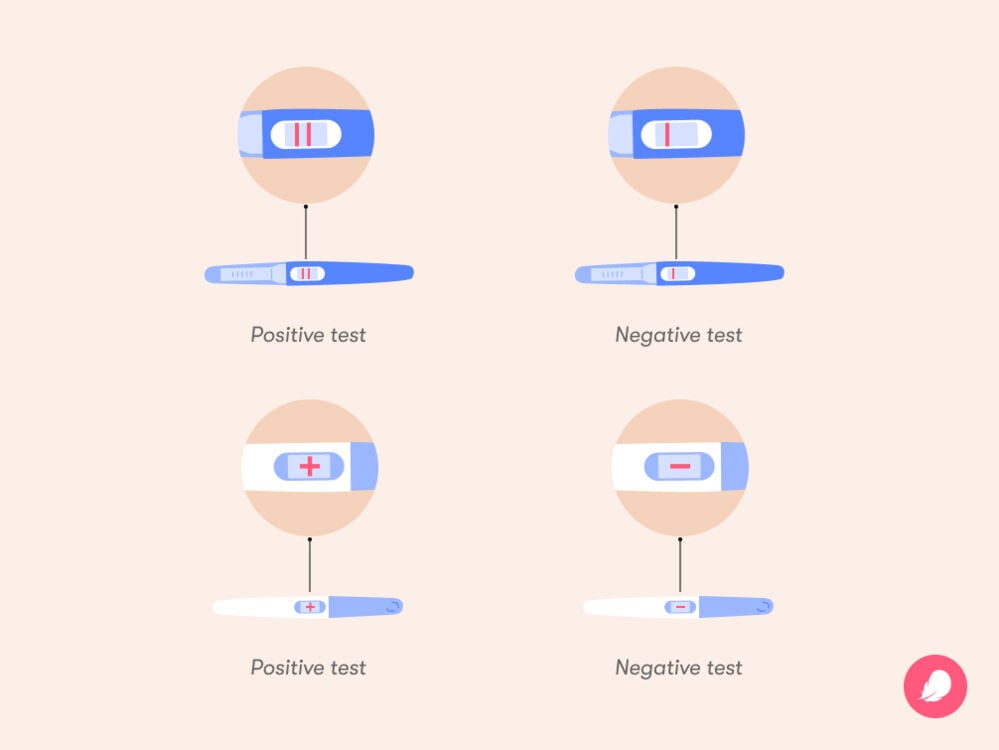
3. Take a pregnancy test
Once that period is due but hasn’t shown, it’s time to test. To boost the accuracy of the test even further, make sure:
- You read the instructions closely.
- You leave it for the specified amount of time before checking it (not more, not less).
- The test is within its expiration date.
4. Consult a medical professional
If you get a positive pregnancy test result, you should make an appointment with a health care professional. They’ll be happy to get started on your pregnancy care or to discuss your other options.
If you have a negative pregnancy test result, it’s not necessary to see a health care professional. You can, though, if your period’s still not arrived and you’re worried you could still be pregnant — or if you’d like to discuss a birth control plan for the future (which is a great idea!).
Understanding your body during ovulation
Ovulation itself may just be a brief moment in time, but it can mean big things for your body. So whether you’re trying to get pregnant, trying not to get pregnant, or just want to understand your body better — you came to the right place.
Remember, the fertile window is when you’re most likely to get pregnant from unprotected sex. So be sure to plan sex around it if you want to get pregnant, or be extra careful with contraception if you don’t.
More frequently asked questions about unprotected sex during ovulation
Can you have unprotected sex during ovulation and not get pregnant?
Yes. If we look at the days leading up to ovulation (as this is when chances of conceiving are highest), research suggests there’s around a 20% to 42% chance of unprotected sex leading to pregnancy. So it’s not guaranteed — but it is the likeliest it’ll be compared to the rest of your menstrual cycle.
Is there a 100% chance of getting pregnant on ovulation day?
No. Research suggests around a 20% chance of unprotected sex on the day of ovulation leading to pregnancy. The chances are actually highest the day before ovulation, where you’re looking at around a 42% likelihood.


Hey, I'm Anique
I started using Flo app to track my period and ovulation because we wanted to have a baby.


The Flo app helped me learn about my body and spot ovulation signs during our conception journey.


I vividly
remember the day
that we switched
Flo into
Pregnancy Mode — it was
such a special
moment.
Real stories, real results
Learn how the Flo app became an amazing cheerleader for us on our conception journey.
References
“Basal Body Temperature for Natural Family Planning.” Mayo Clinic, 10 Feb. 2023, www.mayoclinic.org/tests-procedures/basal-body-temperature/about/pac-20393026.
“Cervical Mucus.” Cleveland Clinic, my.clevelandclinic.org/health/body/21957-cervical-mucus. Accessed 25 Nov. 2024.
“Emergency Contraception.” The American College of Obstetricians and Gynecologists, Aug. 2019, www.acog.org/womens-health/faqs/emergency-contraception.
Faust, Louis, et al. “Findings from a Mobile Application-Based Cohort Are Consistent with Established Knowledge of the Menstrual Cycle, Fertile Window, and Conception.” Fertility and Sterility, vol. 112, no. 3, Sep. 2019, pp. 450-457.e3, doi:10.1016/j.fertnstert.2019.05.008.
Greenberg, Grant M. “Is Natural Family Planning a Highly Effective Method of Birth Control? No: Natural Family Planning Methods Are Overrated.” American Family Physician, vol. 86, no. 10, Nov. 2012, www.aafp.org/pubs/afp/issues/2012/1115/od2.html.
“Home Pregnancy Tests: Can You Trust the Results?” Mayo Clinic, 23 Dec. 2022, www.mayoclinic.org/healthy-lifestyle/getting-pregnant/in-depth/home-pregnancy-tests/art-20047940.
“Human Chorionic Gonadotropin.” Cleveland Clinic, my.clevelandclinic.org/health/articles/22489-human-chorionic-gonadotropin. Accessed 25 Nov. 2024.
“Long-Acting Reversible Contraception Implants and Intrauterine Devices. Practice Bulletin No. 186. American College of Obstetricians and Gynecologists.” Obstetrics and Gynecology, vol. 130, no. 186, 2017, pp. e251–69, www.acog.org/clinical/clinical-guidance/practice-bulletin/articles/2017/11/long-acting-reversible-contraception-implants-and-intrauterine-devices.
“Menstrual Cycle.” Cleveland Clinic, my.clevelandclinic.org/health/articles/10132-menstrual-cycle. Accessed 25 Nov. 2024.
“Morning-after Pill.” Cleveland Clinic, my.clevelandclinic.org/health/treatments/23386-morning-after-pill. Accessed 25 Nov. 2024.
“Morning-after Pill.” Mayo Clinic, 2 July 2024, www.mayoclinic.org/tests-procedures/morning-after-pill/about/pac-20394730.
“Ovulation.” Cleveland Clinic, my.clevelandclinic.org/health/articles/23439-ovulation. Accessed 25 Nov. 2024.
“How Long Do Sperm Live after Ejaculation?” Mayo Clinic, 5 May 2022, www.mayoclinic.org/healthy-lifestyle/getting-pregnant/expert-answers/pregnancy/faq-20058504.
Witt, Barry. “Trying to Get Pregnant? Here’s When to Have Sex.” The American College of Obstetricians and Gynecologists, Aug. 2023, www.acog.org/womens-health/experts-and-stories/the-latest/trying-to-get-pregnant-heres-when-to-have-sex.
“What Is Unprotected Sex?” Brook. hello.brook.org.uk/unprotected-sex. Accessed 25 Nov. 2024.
History of updates
Current version (19 December 2024)
Published (19 December 2024)
In this article

Get your personal guide to fertility
-
Learn how to read your body's ovulation signals
-
Find daily conception tips from our experts
-
Chat with others who are trying to get pregnant




